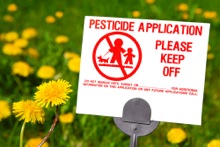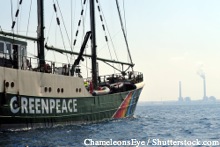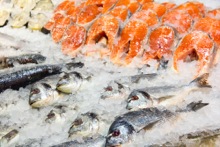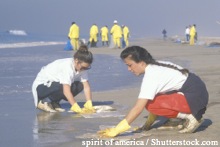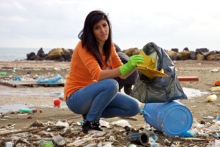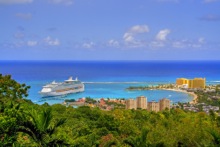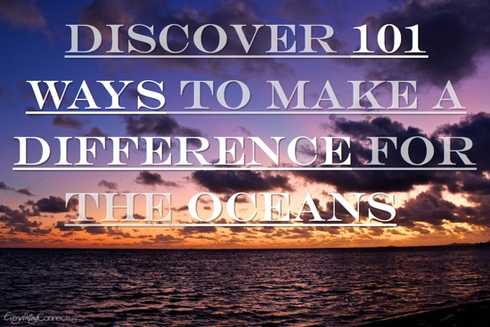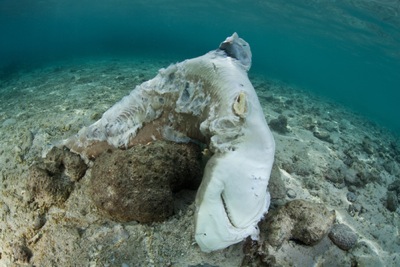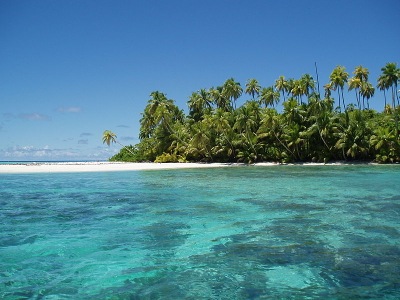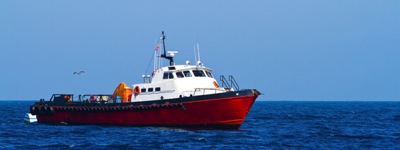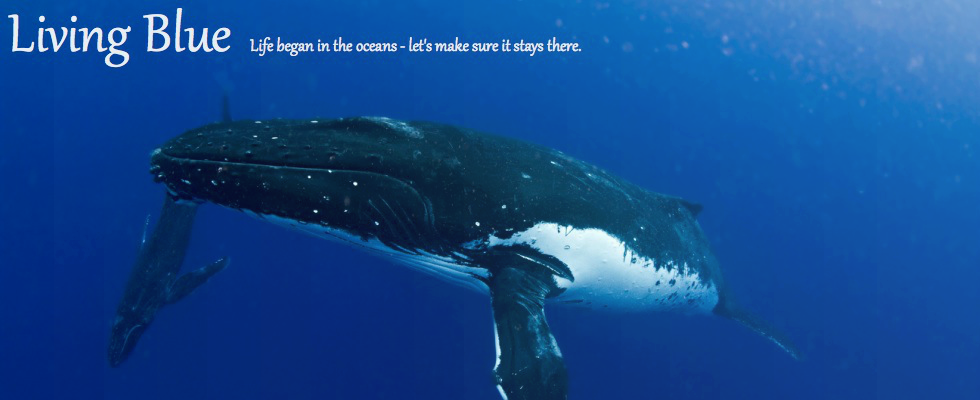
Conserve the Oceans
Throughout Earth's history, there have been
five major extinction events, the last of which killed all the dinosaurs 65 million years ago. We are now in the midst of the
sixth mass extinction, the first caused by a single species: humans. In the heart of this rapid succession of decline, the oceans will be affected most intensely,
losing as much as five times more species than lost on land. From the
tiny plankton responsible for half of all the oxygen we breathe, to the beautiful
coral reefs
protecting our shorelines, to the singing humpback whales, to the seafood we love, immense swaths of the ocean's creatures are being threatened by rapid and non-discriminating forces. As
The Nature Conservancy
puts it, "Oceans may seem vast and endless, but human activity is impacting every part of our waters and putting the health of the oceans in jeopardy. For oceans to keep sustaining us, we must find a way to sustain them." An incredible
80% of all the life on Earth lives beneath the waves
as this vital, vast blue world pulses around the planet driving the natural forces which sustain life on Earth.
Ocean acidification,
coral bleaching
,
pollution,
habitat loss,
destructive fishing practices,
overfishing
and
climate change
are all contributing to this catastrophic loss of life and ecosystem services that will change the oceans as we know them
forever,
unless we act.
Why Live Blue?
"We are all Shepherds of the Sea and those who are not should be, because the stark reality is that if our oceans die, we die! Together we fight not just for the whales, sharks, seals, sea-birds, turtles, and fish, together we fight for our own survival." ~ Captain Paul Watson, Sea Shepherd
Living Blue is Living Healthy!
Human and ocean health are inextricably connected. The consumption of seafood can play an important role in a balanced, healthy diet, however, some fish carry toxins and contaminants, such as mercury, which affects brain function and development, PCBs, dioxins and pesticides, that can be harmful to your health. It is important to avoid these fish not only for yourself, but also due to the fact that
unhealthy fish typically come from unsustainable sources
which greatly contribute to the worldwide depletion of fish stocks and to the startling fact that
by 2048, scientists are predicting all the fish we eat today - extinct. If you must eat fish,
choose sustainable and choose healthy
to boost your omega-3 fatty acids, without risking mercury poisoning or other toxins. Otherwise, the best way to go about seafood is to not go about it at all!
Learn more.
Select a Seafood Watch Pocket Guide
Monterey Bay Aquarium's Seafood Watch pocket guides
provide insightful information on which fish are relatively bountiful and are okay to eat, which fish are overfished and are not okay to eat and which fish contain high levels of mercury, PCBs, dioxins or pesticides that pose a health risk. Choose your region below, print our your pocket guide and keep it handy! You can also use the Monterey Bay Aquarium's iPhone app
as an alternative.
Explore Fish2Fork
Visit Fish2Fork
and discover the campaigning restaurant guide for people who want to eat fish sustainably and be able to:
- Find sustainable seafood restaurants in your area.
- Submit your favorite sustainable seafood chef.
- Report a restaurant that serves fish at risk.
“If the fish is sustainable, then it is likely to be healthy to eat too. In general, larger longer-lived fish are more likely to have exposure to toxins due to the length of their lives and their place on the food chain. So you might be best served to stay away from them – like Bluefin Tuna or Sturgeon. Besides, these stocks have been depleted by fishing. Safer choices might be Alaskan Pollock or Atlantic Mackerel. We used the database to look for patterns of similarity between ecological and health metrics, and found that in general, choosing healthy seafood also means that you are choosing sustainable seafood. Great news for sushi-lovers! Choose the sustainable options and you also are boosting omega-3 intake, without risking mercury poisoning. We want to help people choose fish that are both eco-friendly and healthy.” ~
Leah Gerber, Associate Professor and Senior Sustainability Scientist at Arizona State University
''We've acted as if the supply of fish was limitless and it's not." ~Steve Trent, Executive Director, Environmental Justice Foundation
"Once considered inexhaustible, our oceans are now in a state of global crisis as more and more people compete for fewer and fewer fish. Overfishing threatens coastal communities and the food security of the millions who rely on marine fish as an important source of protein. Yet the solutions are in our hands, because what we buy for dinner tonight can determine whether tomorrow's generations will continue to enjoy the oceans' riches. Or not." ~ WWF
16 Things You Can Do To Help Conserve
the Oceans
"The ocean covers 71 percent of the Earth's surface and contains 97 percent of the planet's water, yet more than 95 percent of the underwater world remains unexplored. The ocean and lakes play an integral role in many of the Earth's systems including climate and weather. The ocean supports the life of nearly 50 percent of all species on Earth and helps sustain that life providing 20 percent of the animal protein and five percent of the total protein in the human diet. One of every six jobs in the United States is marine-related and over one-third of the U.S. Gross National Product originates in coastal areas. The ocean is key to transportation, recreation and its resources may hold the cures to many diseases." ~ National Oceanic and Atmospheric Administration
Be an Ocean Hero by Supporting and Joining these Organizations Working to Protect Marine Habitats and Restore Life to the Oceans
- Oceana - "Oceana, founded in 2001, is the largest international organization focused solely on ocean conservation. Our offices in North America, South America and Europe work together on a limited number of strategic, directed campaigns to achieve measurable outcomes that will help return our oceans to former levels of abundance. We believe in the importance of science in identifying problems and solutions. Our scientists work closely with our teams of economists, lawyers and advocates to achieve tangible results for the oceans."
- Marine Conservation Society - "The Marine Conservation Society, MCS, is the voice for everyone who loves the sea. We work to secure a future for our living seas, and to save our threatened sea life before it is lost forever."
- Center for Biological Diversity - "We defend marine species and habitat from overfishing and a host of other threats from the Sea of Cortez to the Gulf of Mexico and the Atlantic, the Hawaiian archipelago to Japan, and Antarctica north to the Arctic Circle."
- Greenpeace - In the oceans, Greenpeace focuses on: "Whale Defenders, Bering Witness, Seafood, Marine Reserves, Wildlife Facts, Tuna and Ocean Reports."
- Natural Resources Defense Council - "NRDC is the nation's most effective environmental action group, combining the grassroots power of 1.3 million members and online activists with the courtroom clout and expertise of more than 350 lawyers, scientists and other professionals."
- Surfrider Foundation - " Our mission is the protection and enjoyment of oceans, waves and beaches through a powerful activist network."
- Sea Web - "SeaWeb is the only international, nonprofit organization exclusively dedicated to using the science of communications to fundamentally shift the way people interact with the ocean. We transform knowledge into action by shining a spotlight on workable, science-based solutions to the most serious threats facing the ocean, such as climate change, pollution and depletion of marine life. We work collaboratively with targeted sectors to encourage market solutions, policies and behaviors that result in a healthy, thriving ocean. By informing and empowering diverse ocean voices and conservation champions, SeaWeb is creating a culture of ocean conservation."
- Ocean Conservancy - "Ocean Conservancy educates and empowers citizens to take action on behalf of the ocean. From the Arctic to the Gulf of Mexico to the halls of Congress, Ocean Conservancy brings people together to find solutions for our water planet. Informed by science, our work guides policy and engages people in protecting the ocean and its wildlife for future generations."
- World Wildlife Fund - "WWF's Global Marine Programme creates, promotes, and implements solutions to protect marine ecosystems and use marine resources sustainably."
- Sea Shepherd - "Established in 1977, Sea Shepherd Conservation Society (SSCS) is an international non-profit, marine wildlife conservation organization. Our mission is to end the destruction of habitat and slaughter of wildlife in the world's oceans in order to conserve and protect ecosystems and species."
- Blue Ocean Institute - "From Alaskan fishing villages to Zanzibar’s shores, Blue Ocean Institute studies how the ocean is changing and what these changes mean for wildlife and people. We don’t rely on gloomy environmental warnings. We know that predictions don’t move people to make important changes that can help our shared ocean. Instead we seek to inspire a deeper connection with nature, in everyone touched by an ocean. Blue Ocean translates scientific information into language people can understand and serves as a unique voice of hope, guidance, and encouragement."
- Environmental Defense Fund - The ocean goals of EDF is to: "Protect ocean ecosystems by creating sustainable and healthy fisheries. Make catch shares the standard management method in U.S. fisheries. Promote catch shares internationally. Safeguard and restore ocean habitats."
- Earth Justice - "Earthjustice's ocean litigation is working to broaden the federal government's fragmented approach by taking a more holistic view of the ocean ecosystem, a crucial tactic in buffering the ocean against a changing environment."
- The PEW Environment Group - "The Pew Environment Group works to protect ocean life through conserving marine species and ecosystems. We focus on promoting sustainable fisheries, safeguarding sensitive marine habitats, and protecting vulnerable marine biodiversity. Pew supports and applies the best science and analyses to inform policy solutions at all levels, from local and national governments to intergovernmental fora."
- MarineBio - "Since 1998, MarineBio has been a nonprofit volunteer marine conservation and science education group working online together to educate the world about ocean life, marine biology, marine conservation, and to provide a sea ethic that we should all attempt to follow."
- Marine Conservation Institute - "Marine Conservation Institute is a nonprofit organization dedicated to saving our living oceans. We work with scientists, politicians, government officials and other organizations around the world to protect essential ocean places and the wild species in them."
- The Nature Conservancy - "The Nature Conservancy is the leading conservation organization working around the world to protect ecologically important lands and waters for nature and people. We address the most pressing conservation threats at the largest scale."
- Monterey Bay Aquarium - "The mission of the non-profit Monterey Bay Aquarium is to inspire conservation of the oceans."
"Seafood is one of the most popular foods in the United States, yet consumers are routinely given little or no information about the seafood they eat. Plus, the information provided is frequently misleading or fraudulent: recent studies have found that seafood may be mislabeled as often as 25 to 70 percent of the time for fish like red snapper, wild salmon, and Atlantic cod, disguising species that are less desirable, cheaper or more readily available. Seafood fraud can directly threaten human health, creates a market for illegal fishing, make it difficult for consumers to make eco-friendly choices and mislead consumers about the true availability of seafood." ~ Oceana, Seafood Fraud
What are the Health Risks
of Seafood Fraud?
| What Can You Do to Help Prevent It?
"We know that when we protect our oceans, we’re protecting our future." ~ Former U.S. President Bill Clinton
"It is a curious situation that the sea, from which life first arose, should now be threatened by the activities of one form of that life." ~ Rachel Carson



